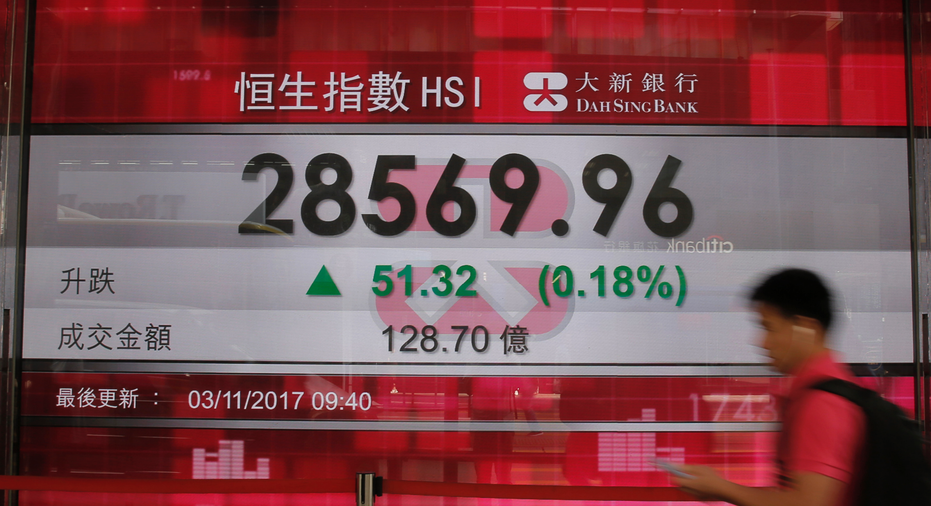Rising tech stocks send S&P 500 to record, 8th weekly gain

NEW YORK – Another spurt higher for Apple and other technology stocks helped the Standard & Poor's 500 set a new record on Friday, and the index closed out an eighth straight week of gains.
It was another mostly calm day for markets after a report showed that the U.S. job market strengthened last month, though not by as much as expected. Bond yields held relatively steady, stock markets around the world rose modestly and the price of oil climbed to its highest level in more than two years.
The S&P 500 rose 7.99 points, or 0.3 percent, to 2,587.84 after flipping between modest gains and losses earlier in the day. The push higher helped it clinch its longest weekly winning streak in nearly four years.
The Dow Jones industrial average rose 22.93 points, or 0.1 percent, to 23,539.19, and the Nasdaq composite climbed 49.49 points, or 0.7 percent, to 6,764.44.
Technology stocks led the way, as they have for most of this year. Apple was at the forefront after it reported stronger revenue and earnings for the latest quarter than analysts forecast. A new iPhone model debuted on Friday, and Apple said it expects the $1,000 phone to make this holiday season its best quarter ever. Apple shares rose $4.39, or 2.6 percent, to $172.50.
On the losing side was American International Group, which fell to one of the sharpest losses in the S&P 500 after it reported weaker results for the latest quarter than analysts expected. The insurer's shares dropped $2.98, or 4.6 percent, to $62.00.
AIG was an outlier in what has been a better-than-expected earnings season. Most companies have delivered higher profits for the July-through-September quarter than Wall Street had forecast, with growth particularly strong for the technology sector.
Early in the day, gains for the market were more tentative after the government released the most highly anticipated economic report of each month: the jobs report.
Employers added 261,000 jobs in October, and the unemployment rate dipped to 4.1 percent, its lowest level in nearly 17 years. But job and wage growth were weaker than economists forecast. Average hourly earnings were up 2.4 percent from a year earlier, a slowdown from September's 2.8 percent rate.
While the jobs report offered a mixed bag, other economic reports on Friday were more encouraging, including ones that showed better-than-expected growth in the nation's service sector and factories, said Phil Orlando, chief equity market strategist at Federated Investors. That has him and other investors confident that the economy is continuing to strengthen, which should translate into higher corporate profits.
"I think these numbers will clean themselves up in the next month or two," Orlando said.
Economists said the last two months' jobs reports have been difficult to parse because of the damage that hurricanes did across broad swaths of the economy. The government initially said employers cut 33,000 jobs in September, but on Friday it said that employment actually grew by 18,000 during the month.
The mostly encouraging reports on the economy bolstered expectations that the Federal Reserve will raise interest rates at its next meeting in December. It would be the third increase this year.
The Fed is slowly reining in the stimulus it provided the economy following the Great Recession. Besides gradually raising interest rates, it's also trimming its bond-investment portfolio. Economists expect the slow pace to continue, even as a new chairman arrives. President Donald Trump on Thursday nominated Jerome "Jay" Powell to succeed Janet Yellen, whose term expires in February.
Interest rates held relatively steady. The yield on the 10-year Treasury note dipped to 2.33 percent from 2.35 percent late Thursday. The two-year yield was unchanged at 1.61 percent, and the 30-year yield slipped to 2.81 percent from 2.83 percent.
In the commodities market, benchmark U.S. crude jumped $1.10 to $55.64 per barrel, its highest settlement price since July 2015. Brent crude, the international standard, rose $1.45 to $62.07.
Natural gas rose 5 cents to $2.98 per 1,000 cubic feet, heating oil gained 3 cents to $1.89 per gallon and wholesale gasoline climbed 2 cents to $1.79 per gallon.
Gold fell $8.90 to $1,269.20 per ounce, silver lost 30 cents to $16.83 per ounce and copper dropped 3 cents to $3.12 per pound.
In overseas stock markets, the French CAC 40 rose 0.1 percent, Germany's DAX gained 0.3 percent and the FTSE 100 in London added 0.1 percent.
South Korea's Kospi index rose 0.5 percent, and the Hang Seng in Hong Kong gained 0.3 percent. Japan's market was closed for a holiday.
The dollar rose to 114.16 Japanese yen from 114.00 yen late Thursday. The euro dipped to $1.1608 from $1.1659, and the British pound rose to $1.3069 from $1.3060.



















